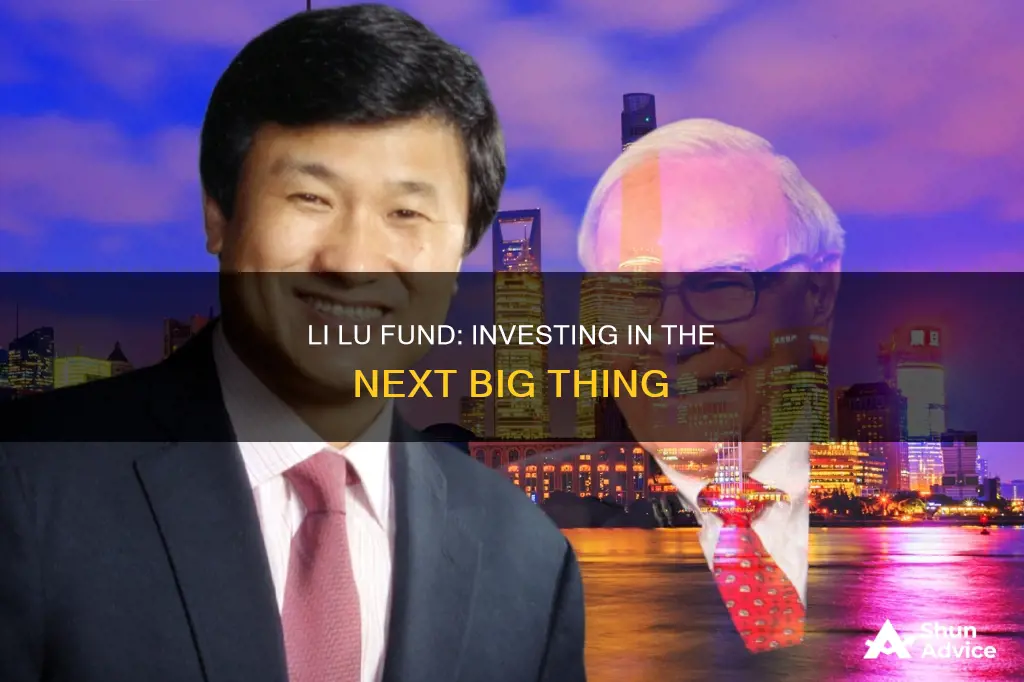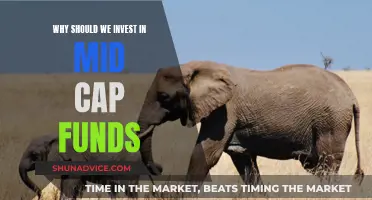
Li Lu is a Chinese-born American value investor, businessman, and philanthropist. He is the founder and chairman of Himalaya Capital, a value investing firm that has produced a 30% compound annual return since its inception in 1997 or 1998. Li Lu's investment portfolio includes stakes in established companies across sectors such as finance, technology, and diversified holdings. With a strategic approach to investing, Lu focuses on long-term growth and value. So, how can one invest in the Li Lu fund, and is it a good idea?
| Characteristics | Values |
|---|---|
| Founder | Li Lu |
| Company | Himalaya Capital |
| Company Type | Value investment firm |
| Investment Principles | Benjamin Graham, Warren Buffett, Charles Munger |
| Focus | Publicly traded companies in Asia, with an emphasis on China |
| Client Base | University endowments, foundations, family offices, individuals, pension plans |
| Holdings | Bank of America Corp., Alphabet Inc. (Class C and Class A), Berkshire Hathaway Inc. (Class B), East West Bancorp, Occidental Petroleum |
| Portfolio Value | $2.56 billion |
What You'll Learn

Li Lu's investment philosophy
Li Lu's approach can be summarised by his own words: "In making investments, I have always believed that you must act with discipline whenever you see something you truly like". He uses a baseball analogy to explain this philosophy:
> "Ted Williams is the only baseball player who had a .400 single-season hitting record in the last seven decades. In the Science of Hitting, he explained his technique. He divided the strike zone into seventy-seven cells, each representing the size of a baseball. He would insist on swinging only at balls in his 'best' cells, even at the risk of striking out, because reaching for the 'worst' spots would seriously reduce his chances of success. As a securities investor, you can watch all sorts of business propositions in the form of security prices thrown at you all the time. For the most part, you don’t have to do a thing other than be amused. Once in a while, you will find a 'fat pitch' that is slow, straight, and right in the middle of your sweet spot. Then you swing hard. This way, no matter what natural ability you start with, you will substantially increase your hitting average. One common problem for investors is that they tend to swing too often. This is true for both individuals and for professional investors operating under institutional imperatives, one version of which drove me out of the conventional long/short hedge fund operation. However, the opposite problem is equally harmful to long-term results: You discover a 'fat pitch' but are unable to swing with the full weight of your capital."
Li Lu's philosophy is also reflected in his investment choices. For example, his conviction in financial services, technology, and diversified holdings. He has demonstrated a focus on value and long-term growth by investing in established companies such as Bank of America Corp., Alphabet Inc., and Berkshire Hathaway Inc.
Fidelity Index Funds: Smart, Secure, Long-Term Investment Options
You may want to see also

Li Lu's investment strategy
Li Lu is a Chinese-born American value investor, businessman and philanthropist. He is the founder and chairman of Himalaya Capital, a value investing firm. Li Lu's investment strategy can be summarised as follows:
Long-term focus
Li Lu's portfolio showcases a strategic selection of established companies, demonstrating his focus on value and long-term growth. He rarely pays attention to current stock value and frequent short-term fluctuations in price. Instead, he prefers investing in companies that can bring long-term returns.
Industry-leading companies
Li Lu's overall strategy is to pick robust, industry-leading companies capable of sustaining profitability and ensuring durable competitive advantages. He focuses on the nature of a business' competition "such that one could predict the outcome in 10 years, even with all the up and downs in the macro environment".
Accurate and complete information
Li Lu's investing mantra is "accurate and complete information". This includes understanding the character of a CEO by visiting his local church and speaking to his neighbours. He believes the most important thing in investing is intellectual honesty, recognising that there is always a possibility that "you don't know that you don't know".
Value investing
Li Lu is known as an investor who utilises value investing strategies. Throughout his career, he has searched for undervalued companies trading below their intrinsic value. He digs deep when conducting company analysis, trying to find potential in a company. He knows that a low stock price is not the only factor that drives sales. He focuses on strong company fundamentals, competitive advantages, and a responsible management team.
Margin of safety
Li Lu uses the margin of safety as a risk management strategy to protect his portfolio from sudden market surges. He also uses it to identify potential investments with the largest margin of safety, so it can provide a massive barrier against potential risks.
Geographic diversification
Li Lu is known for his preference for geographic diversification. He often invests in companies beyond the United States, particularly in China.
High-Yield Bond Funds: When to Invest and Why
You may want to see also

Li Lu's portfolio holdings
Li Lu is an investor and businessman who founded Himalaya Capital in 1997. He was born in China but currently resides in the United States. He studied at Columbia University, where he was inspired to buy his first stocks after listening to a lecture from Warren Buffett.
- Bank of America Corp. (BAC): Li Lu's largest holding is in Bank of America Corp., a leading banking institution. This reflects his confidence in the traditional financial sector's resilience and potential for steady returns amid economic cycles. Bank of America accounts for 29.2% of his portfolio, with an average buy price of $32.48 and a current price of $40.19.
- Alphabet Inc. - Ordinary Shares - Class C (GOOG): Alphabet Inc. Class C shares embody a high-growth trajectory, with a focus on innovation and market dominance in online advertising and various tech segments. These shares do not carry voting rights but offer the same economic exposure as Class A shares. Alphabet Inc. Class C shares make up 19.9% of Li Lu's portfolio, with an average buy price of $89.55 and a current price of $163.06.
- Alphabet Inc. - Ordinary Shares - Class A (GOOGL): Alphabet Inc. Class A shares represent a stake in a technology leader with added voting power. This holding signals Li Lu's strong belief in Alphabet's enduring strength and leadership in global technology advancements. Alphabet Inc. Class A shares constitute 16.5% of his portfolio, with an average buy price of $103.50 and a current price of $161.86.
- Berkshire Hathaway Inc. - Ordinary Shares - Class B (BRK.B): Berkshire Hathaway Class B shares reflect Li Lu's admiration for Warren Buffett's investment approach. The company has a diverse array of subsidiaries and stock investments, offering both stability and the potential for appreciation. Berkshire Hathaway Class B shares comprise 14.6% of his portfolio, with an average buy price of $280.86 and a current price of $405.77.
- East West Bancorp, Inc. (EWBC): East West Bancorp is a regional bank focusing primarily on the United States and China. This holding signifies Li Lu's interest in niche financial markets and his ability to recognize valuable players within the international banking scene. East West Bancorp accounts for an unknown percentage of his portfolio, with an average buy price of $65.86 and a current price of $85.27.
Li Lu's portfolio also includes other holdings, such as Occidental Petroleum (OXY) and PDD Holdings Inc. - ADR, although the percentages of these holdings are not specified.
Mutual Fund Investments: Reporting 1099-INT Details
You may want to see also

Li Lu's performance evaluation
Evaluating Li Lu's portfolio performance is challenging due to the privacy he maintains around his investment operations. However, based on publicly available data, we can discern several key aspects of his investment strategy and performance.
Li Lu is a renowned Chinese-born American value investor and businessman. He founded Himalaya Capital Management in 1997, known for its disciplined and value-oriented approach. His investment philosophy is influenced by Warren Buffett, Benjamin Graham, and Charlie Munger, focusing on long-term ownership of high-quality companies with substantial "economic moats" and trustworthy management.
Li Lu's portfolio is highly concentrated, currently holding stakes in 6 companies, with a total value of $2.1 billion as of early 2024. His top holdings include Bank of America, Alphabet (Class C and Class A shares), Berkshire Hathaway (Class B shares), and East West Bancorp. These investments reflect his conviction in the financial services and technology sectors, as well as his focus on established, industry-leading companies with strong growth potential.
Li Lu's investment strategy involves identifying undervalued companies trading below their intrinsic value and conducting thorough company analysis to find potential. He emphasizes the importance of understanding the market and avoiding frequent trading. His approach has resulted in impressive returns, with his fund achieving over 30% compound annual returns since its inception. The highest performance was recorded in 2021 and the first half of 2022, with returns dropping by around 10% in the last year but still maintaining a margin of over 30%.
Li Lu's success as a value investor has gained him recognition, and he has been described as the "Chinese Warren Buffett" by Charlie Munger himself. His influence extends beyond investment circles, as he is also a philanthropist and the co-founder of The Asian American Foundation, serving the Asian American and Pacific Islander community.
Smartly Investing 100K in Mutual Funds at 35
You may want to see also

Himalaya Capital Management
The company's investment philosophy is rooted in the value investment principles of Benjamin Graham, Warren Buffett, and Charles Munger. They seek to identify and invest in long-term compounders, focusing on the nature of a business' competition and its potential for growth over time. This approach has resulted in impressive returns, with Himalaya Capital Management averaging 30% returns annually and a portfolio value of over $9 billion.
Li Lu's own investment journey began when he attended a lecture at Columbia University by Warren Buffett in 1993. Inspired by Buffett's principles of investing in the stock market, Li Lu began investing in stocks while still a student. He founded Himalaya Capital Management in 1997, embracing the value investment strategies that have guided his career.
Li Lu's investment strategy involves seeking out undervalued companies with strong fundamentals, competitive advantages, and trustworthy management. He is known for his focus on geographical diversification, particularly investing in companies in China. One of his notable investments was in BYD Company, a Chinese battery and electric car maker, which he introduced to Warren Buffett and Charlie Munger.
In summary, Himalaya Capital Management, founded by Li Lu, is a successful investment firm that has achieved impressive returns by adhering to a disciplined and value-oriented approach, focusing on high-quality companies with strong growth potential.
Strategies to Secure Investment Funding: A Comprehensive Guide
You may want to see also
Frequently asked questions
The Li Lu fund is Himalaya Capital, a value investment firm founded by Li Lu in 1997. The fund focuses on publicly traded companies in Asia, with an emphasis on China.
The fund embraces the value investment principles of Benjamin Graham, Warren Buffett, and Charles Munger. It aims to achieve superior returns by being long-term owners of high-quality companies with substantial "economic moats", great growth potential, and trustworthy management.
The fund has reportedly produced a 30% compound annual return since its inception, putting Li Lu in the same league as renowned investors such as Warren Buffett, Charlie Munger, and Peter Cundill. A $1,000 investment with Himalaya Capital would have yielded a total return of $321,000, compared to $6,600 achieved by the S&P 500 over the same period.
Himalaya Capital's partnership is generally closed to new partners. However, they selectively hold discussions with referrals from current partners.







